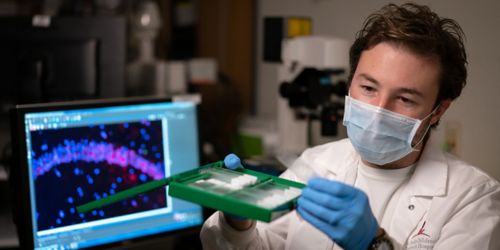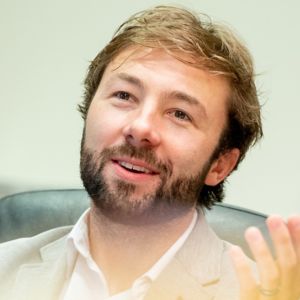St. Jude Family of Websites
Explore our cutting edge research, world-class patient care, career opportunities and more.
St. Jude Children's Research Hospital Home

- Fundraising
St. Jude Family of Websites
Explore our cutting edge research, world-class patient care, career opportunities and more.
St. Jude Children's Research Hospital Home

- Fundraising
What I discovered during my postdoctoral fellowship shaped my scientific steps

Brad Heckmann, PhD, will continue investigating the LC3-associated endocytosis, also known as LANDO, pathway in his lab at USF.
When I began my postdoctoral fellowship in the lab of Doug Green, PhD, I didn’t know what we would discover. Four years later, I was fortunate to be a part of a novel scientific discovery that will follow me for the rest of my career.
It also helps that we had the opportunity to name it, a chance that rarely happens in science.
We will always be known for identifying LC3-associated endocytosis, which we named LANDO.
Another step in a science career
Discovering LANDO certainly played a significant role in advancing my career. This discovery resulted in multiple high-impact publications and ignited scientific interest in the role of the autophagy machinery in the brain and beyond.
I will continue this work in my lab as Neuroimmunologist and Investigator at USF Health Byrd Alzheimer’s Center and Research Institute and USF Health Neuroscience Institute. I’ll also be an Assistant Professor in the Department of Molecular Medicine at USF Health Morsani College of Medicine.
Working in Green’s lab for the past four years has been one of the highlights of my career. We see science in a similar way, and we worked well together. He was open to trying new ideas and exploring new areas of research.
Working toward therapies for Alzheimer’s and cancer
My interest in Alzheimer’s and other neuroimmune and neurodegenerative conditions stems from the neuroimmune system itself. We call the brain an immune privileged organ because it essentially has its own immune system and communicates with the peripheral immune system. This is a fascinating new field of investigation with many research opportunities to advance our understanding of the immune system as a whole. It’s exciting to know that our work may eventually lead to therapies against diseases like Alzheimer’s and cancer.
As a freshman at the University of Kentucky, I researched and studied drug delivery systems. This work, and later work in the lab of Edmund Rucker, PhD, shaped my view of basic science — the opportunity to discover something new and impactful drew me toward laboratory science. Each step I made, from graduate school at the Mayo Clinic to a postdoctoral fellowship here at St. Jude, reaffirmed that decision.
Understand where the science is going and follow the data
Before I came to St. Jude, I had been well-mentored and was used to working independently. New PhDs and new postdocs take note: Understanding where the science is going and developing novel ideas to test it is very important. It is a key aspect of being able to work in a large lab. One of Green’s favorite things to tell us was “always follow the data.” As a scientist, we always want to question and ask what if, what’s next, and how does what we are studying alter our understanding of the universe (or in our case, medicine and human biology)?
When Green and I developed the project that led to the discovery of LANDO, we didn’t know what would result from the work. It could have easily turned out that nothing came from it other than a better understanding – but the key was continuing to explore and learn.
Conducting research at St. Jude is unique in that the availability of core resources for research and expertise in a whole variety of fields allows investigators to take advantage of some of the best research tools science has to offer. It afforded me the ability to focus on other bench work, establish collaborations and think of the next steps to an idea.
Postdoctoral fellowship is just part of the journey
Most graduate students seeking a career in academic research are underprepared. The postdoctoral fellowship is just the stepping stone – if you’renot going into it thinking that your career depends upon what you do, you’re setting yourself up to fail. If you have the mindset that this time is your career to gain or lose, your time will almost certainly be more successful.
You will face failures – learn from them and let your failures shape what you do next. As a grad student or new postdoc, make sure you’re pursuing this career for the love of science and discovery. Money, fame or a lack of other options won’t sustain you through difficult periods. Most importantly, read. The more scientific literature you take in, the more ideas and more success you’re setting yourself up for. Reading and being intimately connected to the literature, not just your specific field, is more important and more fruitful than just hours of bench work.
Working with Green provided me a broader foundation to lead my own research group. There are many things I’ve learned in my four years in his lab that I will take with me to my lab. We will continue to work in Alzheimer’s and brain tumors, but I will also branch out and look at the overall regulation of the neuroimmune system.
I have truly been blessed and am grateful for the partnerships and friendships I have made through my fellowship at St. Jude, and I look forward to future collaborations to advance scientific discovery.






